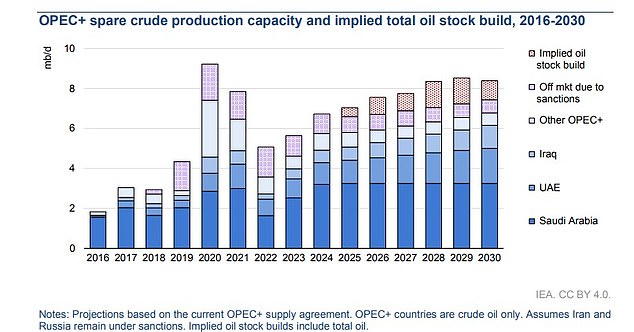- IEA says there will be a ‘staggering’ oil surplus by the end of the decade
There will be a “staggering” oil glut by the end of the decade as companies ramp up production, the International Energy Agency has warned.
In its annual report on the industry, the IEA said oil demand looks set to peak in 2029, amid record production levels, driven by the United States.
Global oil demand will contract from 2030, the results add.
Data: There will be a ‘staggering’ oil glut by the end of the decade, IEA said
The report said: ‘Emerging economies in Asia, particularly China and India, account for all global demand growth. On the contrary, oil demand in advanced economies falls sharply.
The Paris-based energy watchdog forecasts supply capacity will reach nearly 114 million barrels per day by 2030, or 8 million bpd above projected demand in its annual oil report.
Faith Birol, director of the agency, said: “Oil companies may want to ensure their strategies and business plans are prepared for the changes taking place.”
According to the IEA, the “enormous cushion” of surplus oil could “upend” OPEC+’s attempt to manage the market and drive down prices.
Weaker macroeconomic expectations, coupled with new government policies and regulations to accelerate the energy transition, will increase pressure on oil companies, the IEA said.
Last year, the IEA said the world was at the “beginning of the end” of the fossil fuel era, amid a push towards renewable forms of energy and electric vehicles.

Changes: Last year, the IEA said the world was at the “beginning of the end” of the fossil fuel era.
On Wednesday, the IEA questioned whether OPEC+ countries, led by Russia, could continue to increase production.
It said: “This year, the group’s total oil market share has fallen to 48.5 percent, the lowest since it was formed in 2016, due to its steep voluntary production cuts.”
The IEA said that even with the “deep cuts” in production being made by OPEC+ members, “the bloc would pump its crude oil above demand to varying degrees between 2025 and 2030.”
Haitham Al Ghais, secretary general of OPEC, called the IEA forecasts “dangerous” and warned of “energy chaos on a potentially unprecedented scale” if companies suspend their investments in oil and gas.


